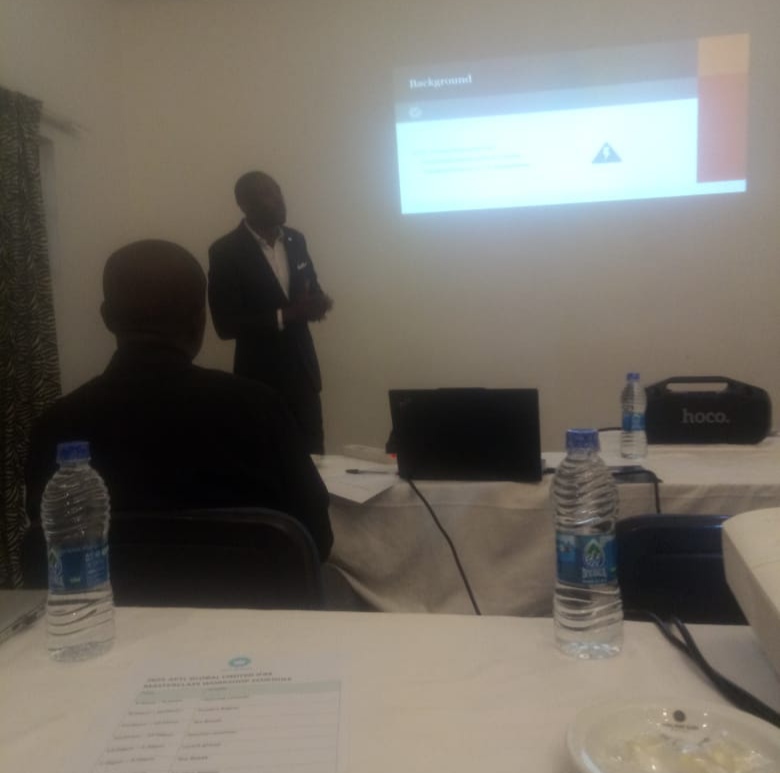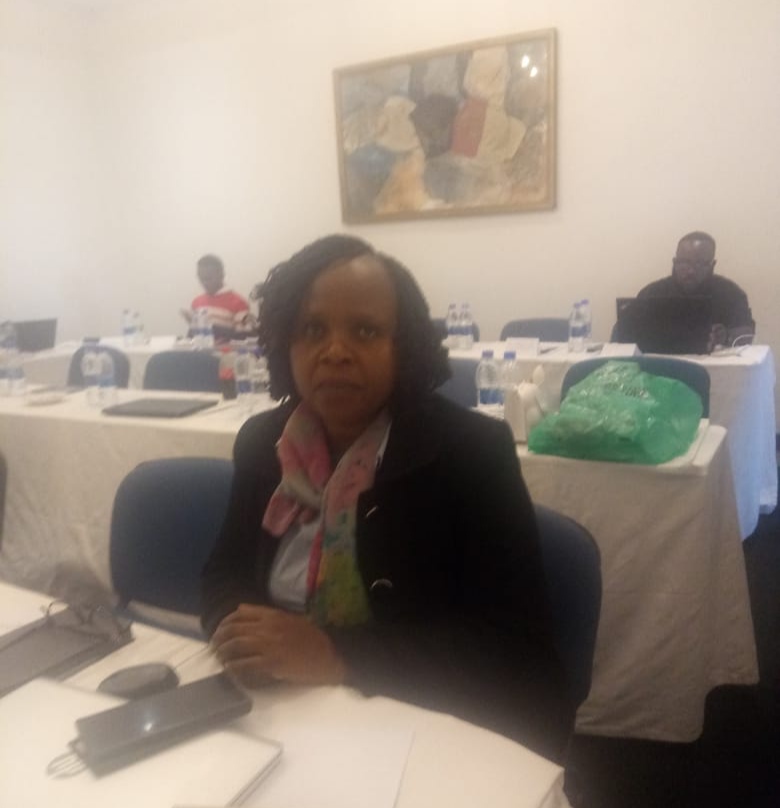By Jones Gadama
In a decisive move to strengthen financial reporting capabilities and promote adherence to international accounting standards, APTL Global Limited recently hosted an intensive IFRS (International Financial Reporting Standards) masterclass workshop.
This event attracted a diverse group of finance professionals eager to deepen their understanding of IFRS and enhance their practical skills in applying these globally recognized standards.
Victor Luhanga, Business Development Officer at APTL Global Limited, emphasized the company’s motivation behind organizing the workshop, stating, “APTL Global Limited is committed to enhancing professional standards in financial reporting across the region. We recognized a growing need for comprehensive IFRS training to help professionals stay updated with global accounting standards.
Hosting this masterclass aligns with our mission to empower businesses and individuals with relevant knowledge that drives transparency, compliance, and excellence in financial management.”
His words encapsulate the company’s dedication not only to capacity building but also to fostering a culture of accountability and excellence in financial practices.
The workshop aimed to equip attendees with a robust understanding of IFRS principles and their practical application. According to Luhanga, the benefits of such training extend beyond technical knowledge.

“Attendees will gain a deeper understanding of IFRS principles, enabling them to apply these standards effectively in their roles.
This not only enhances their technical skills but also boosts their confidence and credibility as finance professionals.
The knowledge gained can open doors to career advancement and improve their ability to contribute strategically to their organizations.”
One of the key challenges the workshop sought to address was the complexity and frequent updates of IFRS standards. Luhanga remarked, “We hope participants will overcome challenges such as interpreting complex IFRS standards, dealing with frequent updates, and implementing these standards consistently across different financial scenarios.
The workshop aims to provide practical solutions and clarify ambiguities that often hinder proper IFRS adoption.”
This focus on clarity and practical application is vital for organizations striving to maintain accurate financial reporting in a constantly evolving regulatory environment.
The event was enriched by the participation of several renowned IFRS experts and seasoned practitioners.
These specialists brought invaluable insights drawn from their extensive experience in both public and private sectors.
Luhanga highlighted, “Their insights and real-world examples will enrich the learning experience and provide attendees with valuable perspectives on IFRS application.” Such expert contributions are critical in bridging the gap between theoretical standards and everyday financial reporting challenges.
APTL Global Limited’s commitment to supporting attendees extends beyond the workshop itself.
“Beyond the workshop, APTL Global will offer continuous support through follow-up webinars, resource sharing, and consultation services,” Luhanga explained. “We aim to build a community of practice where participants can exchange ideas and seek expert advice as they implement IFRS standards in their workplaces.”
This ongoing engagement underscores APTL’s vision of nurturing a sustainable learning environment for finance professionals.
Participants expressed high expectations for the workshop, exemplified by Agnes Kamwiyo, who represented the attendee group.
She conveyed her anticipation with clarity: “I expect to gain comprehensive, practical knowledge of IFRS that is directly applicable to my daily work. I am looking forward to learning about recent updates and how to tackle common implementation challenges effectively.”
Kamwiyo’s perspective reflects the practical orientation and hands-on approach that many professionals seek in IFRS training.
Kamwiyo also shared her views on the positive impacts IFRS implementation has on organizational financial reporting and decision-making. “Implementing IFRS will enhance the accuracy, transparency, and comparability of our financial reports. This will support better-informed decision-making by management, investors, and other stakeholders, ultimately leading to improved organizational performance.”
This acknowledgment highlights the critical role of IFRS not just in compliance, but as a strategic tool for driving better business outcomes.
However, Kamwiyo also noted some of the challenges faced by organizations in IFRS adoption. “Some challenges include interpreting complex standards and ensuring consistent application across departments. I hope the workshop will provide clear guidance and practical tools to overcome these difficulties.”
This desire for clarity and practical assistance is a common theme among finance professionals navigating the evolving standards.
Sharing her experiences, Kamwiyo recounted best practices she has seen in successful IFRS implementation.
“In my experience, successful IFRS implementation often involves thorough staff training and regular internal audits to ensure compliance. One best practice is fostering collaboration between finance and other departments to ensure a holistic approach to financial reporting.”
This insight underlines the importance of organizational alignment and continuous education in achieving IFRS compliance.
Looking ahead, Kamwiyo intends to leverage the workshop’s knowledge to enhance her organization’s financial reporting quality.
“I plan to use the insights gained to improve the accuracy of our financial statements and to train my team on IFRS requirements, ensuring that our organization remains compliant and competitive,” Kamwiyo said.
Her proactive approach demonstrates the tangible benefits such workshops provide to participating institutions.
Guiding the workshop was facilitator Moffat Ngalande, who provided an overview of the session’s content and objectives.
“This workshop offers an in-depth exploration of IFRS principles, practical application techniques, and the latest updates. Attendees will learn to interpret standards confidently and apply them to real-world financial reporting scenarios,” said Ngalande.
His comprehensive teaching approach aimed to demystify IFRS and build participants’ confidence.
Ngalande highlighted critical IFRS topics covered during the masterclass, including “key standards such as revenue recognition, leases, financial instruments, and impairment of assets.
Emphasis was also placed on understanding the conceptual framework and how to handle disclosures effectively.” This focused curriculum ensures that attendees grasp both fundamental and advanced aspects of IFRS.
Reflecting on the evolution of IFRS implementation, Ngalande observed, “IFRS has become more comprehensive and complex, reflecting changes in the global economic environment.
Organizations still struggle with interpreting new standards, integrating IFRS into existing systems, and managing the costs of transition.”
His comments underline the persistent challenges that require ongoing education and strategic planning.
Ngalande shared several best practices for successful IFRS implementation, advising, “Early planning, ongoing training, stakeholder engagement, and leveraging technology to streamline reporting processes are essential. I also highlighted the importance of robust internal controls and continuous monitoring.”
These recommendations offer a roadmap for organizations aiming to achieve smooth and compliant IFRS adoption.
He further explained how attendees can translate their learning into everyday work, stating, “Participants will be equipped to prepare compliant financial statements, conduct accurate financial analysis, and provide reliable information for strategic decisions, improving overall organizational performance.”
This practical application is a key measure of the workshop’s success.
The facilitator also pointed out recent IFRS updates addressed in the workshop, including “amendments related to lease accounting and classification of liabilities,” ensuring that participants remain current with evolving standards.
Discussing the broader impacts of IFRS, Ngalande said, “IFRS enhances transparency and comparability of financial information, which improves stakeholder trust and supports more informed decision-making by management and investors.” This reinforces the role of IFRS as a cornerstone of good governance and financial integrity.
To bring theory to life, Ngalande shared real-life case studies focusing on “the application of IFRS 16 on leases and IFRS 9 on financial instruments, showing how companies have successfully navigated complex reporting requirements.”
These examples provide attendees with valuable lessons and practical insights.
Highlighting common pitfalls, Ngalande cautioned against “inadequate staff training, poor documentation, and failure to update accounting systems,” noting that “these can be avoided through proper planning, continuous education, and strong governance.”
This proactive approach helps organizations mitigate risks associated with IFRS implementation.
Finally, Ngalande outlined how the workshop supports continued learning:
“The workshop includes resources for ongoing learning and access to updates from standard-setting bodies. We also encourage participants to join professional networks and subscribe to relevant publications for continuous knowledge enhancement.”
This ongoing support is vital for professionals to keep pace with the dynamic IFRS landscape.
APTL Global Limited, the organizer of this impactful event, is a leading professional services company focused on business development and capacity building in the financial sector.
Their dedication to fostering excellence through education and support has positioned them as a vital partner for organizations seeking to adopt and maintain high standards in financial reporting.
This IFRS masterclass workshop is a testament to APTL Global’s commitment to empowering finance professionals and contributing to the development of transparent, accountable business environments.
The IFRS masterclass workshop hosted by APTL Global Limited not only provided critical knowledge and skills to finance professionals but also fostered a community of practice dedicated to continuous improvement in financial reporting.
With insights from organizers, participants, and facilitators alike, the event has set a strong foundation for enhanced compliance, better decision-making, and professional growth within the region’s financial landscape.




